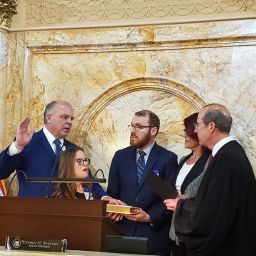
Trenton – Legislation sponsored by Senator Linda Greenstein, Senator Nilsa Cruz-Perez and Senator M. Teresa Ruiz, which would provide certain protections to incarcerated parents in correctional facilities who are primary caretakers of their children, passed the Senate Budget and Appropriations Committee yesterday.
“Our criminal justice system has work to do when it comes to incarcerated primary caretakers and their children,” said Senator Greenstein (D-Mercer/Middlesex). “When families are fractured, it results in immense mental and emotional distress. Inmates do not deserve to be stripped of their dignity and especially not their right to maintain a relationship with their children. Our criminal justice system needs reform, and one of those reforms is to put families first. This legislation underscores the importance of visitation and a renewed approach for our correctional facilities to understand and respect the unique rights of incarcerated caregivers.”
The bill, S-2540, would require the Commissioner of Corrections and the chief executive officer of each county correctional facility to adopt policies concerning primary caretakers of children. An inmate who has a child would be placed in a facility as close to the child as possible at the request of the inmate and prior to sentencing.
The bill would also establish a minimum standard for hours of visitation, prohibiting restrictions on the number of children allowed to visit and authorize the minimum number of adult visitors and contact visits.
“Our society has made strides in understanding and addressing mental health issues and it’s time for our criminal justice system to do the same,” said Senator Cruz-Perez (D-Camden/Gloucester). “There are many mentally taxing attributes of incarceration and being away from your children for an extended period of time takes an enormous emotional toll on both the inmate and the child. This can lead to devastating consequences for the inmates and their families. We need to focus on rehabbing individuals and emphasizing reentry, not breaking them down mentally and isolating them from their families.”
“The greater we can support our families, both who are incarcerated and those who are negatively impacted, with resources and services, the greater the chance we can reduce recidivism,” said Senator Ruiz (D-Essex).
The bill would require the following:
• Prohibit solitary confinement and the shackling of pregnant inmates
• The availability of parenting classes
• Trauma-informed care for inmates and the training of corrections officers to interact with victims of trauma
• Mentoring by former inmates to assist with reentry
• Feminine hygiene products to be made available free-of-charge
• Prohibiting corrections officers from entering the restrooms or showers of the opposite sex unless deemed necessary by the commissioner
• The option for primary caretaker parents to enroll in residential drug abuse and mental health programs
The bill would also clarify the responsibilities of the Office of the Corrections Ombudsperson. Currently, the office is responsible for establishing and implementing procedures to elicit, receive, process, respond and resolve complaints from inmates, their families, other interested citizens, public officials, and government agencies concerning conditions of confinement. The office would be required to provide information to inmates and their families, promote public awareness of the rights of inmates, identify systematic issues and responses and ensure compliance with relevant laws and policies.
The ombudsperson would be appointed by, and report to, the governor for a term of five-years unless a successor is appointed.
The bill was released by the committee with a vote of 10-2.












